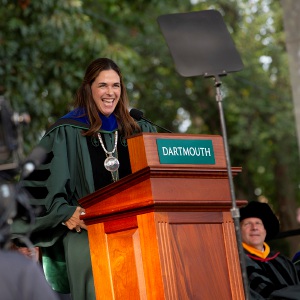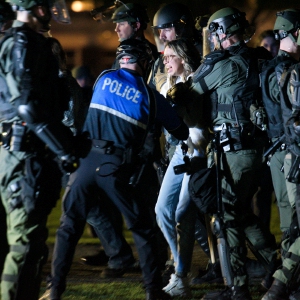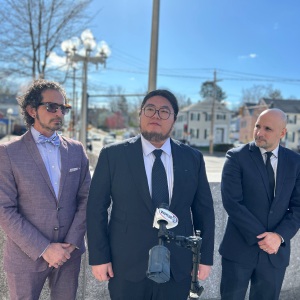Several Democratic primaries feature candidates with conservative ties

Hartford Selectboard member Sue Buckholz, back left, reaches to take the microphone from White River Junction Democrat Joe Major, back right, as his time expires during a forum for candidates in the Windsor Senate District Primary at Bugbee Senior Center in White River Junciton, Vt., on Tuesday, Aug. 6, 2024. Half of the primary candidates in the field, from left, Jonathan Gleason, R-Ludlow, Jack Williams, R-Perkinsville, Major, and Alison Clarkson, D-Woodstock, attended and took questions from constituents on subjects ranging from climate change to tax policy and education. (Valley News - James M. Patterson) Copyright Valley News. May not be reprinted or used online without permission. Send requests to permission@vnews.com. James M. Patterson
| Published: 08-07-2024 4:03 PM |
When Vermont voters fill out their primary ballots next week, the party labels beside candidates’ names may not always mean what they seem.
Several candidates running as Democrats in Vermont’s gubernatorial and legislative races have a demonstrated history with the Republican Party and conservative movements — including two who have run as Republicans in recent elections. Their place on the Democratic ballot is possible because Vermont doesn’t have party registration and, according to candidates and party officials, it is relatively easy to qualify for Vermont elections.
At the top of the Democratic primary ballot for all Vermonters is Peter Duval, a former Underhill Selectboard member who was ousted by local voters in 2021. In 2022, Duval competed in a three-way Republican gubernatorial primary, which incumbent Gov. Phil Scott won handily. Duval went on to unsuccessfully compete in that year’s general election as an independent.
Asked in a recent interview why he opted for the Democratic line this time — and whether he’s had a genuine evolution in his political ideology over the past two years — Duval answered, “I’m still a fusion candidate, still not part of any machinery.”
Meanwhile, Duval’s primary opponent, Esther Charlestin, an educator from Middlebury, is a self-described “Democrat through and through,” she told VTDigger recently, who declared her candidacy in January and has the backing of the Vermont Democratic Party.
“What I know about systems is, there are loopholes, and there are people who find those loopholes to make a case for themselves,” Charlestin said.
Vermont has, according to political party leaders and candidates alike, extremely permissive laws in order for candidates to get on the ballot. Candidates for the Vermont House need only 50 signatures from local voters in order to qualify for the primary ballot. For the state Senate, that number is 100, and for statewide office, 500.
And vitally, there is no party registration in Vermont. That means that any candidate who files a petition to run in a primary race does not need to have a demonstrated history or affinity with that party. In fact, in some cases this election cycle, the opposite is true.
Article continues after...
Yesterday's Most Read Articles
 Hundreds of alumni sign letter urging Beilock, Dartmouth to make a stand for academic freedom
Hundreds of alumni sign letter urging Beilock, Dartmouth to make a stand for academic freedom
 Kenyon: A year later, effects of mass arrests at Dartmouth linger
Kenyon: A year later, effects of mass arrests at Dartmouth linger
 ‘A bit Kafkaesque’: Federal judge spars with government lawyer over status of Dartmouth international student
‘A bit Kafkaesque’: Federal judge spars with government lawyer over status of Dartmouth international student
 Woodstock demotes police chief to patrol officer
Woodstock demotes police chief to patrol officer
 High school baseball: Windsor rebuilds while Thetford shines
High school baseball: Windsor rebuilds while Thetford shines
 Outgoing Alice Peck Day CEO led hospital through growth and change
Outgoing Alice Peck Day CEO led hospital through growth and change
Even this cycle, Duval said, he “tested” a Republican gubernatorial primary petition and couldn’t garner the signatures. “It was so much harder this time to get anyone to listen to me,” he said.
“That’s not the major reason, but that was an aspect of it that made me go for the Democratic primary,” Duval said. “The reason I’m going for the Democratic primary is the same reason that all the Progressives go into the Democratic primary. It’s where the action is. It’s where you can get traction early in the season.”
Indeed, ahead of the Aug. 13 primary, Duval has stood opposite Charlestin for two debates hosted by Vermont media outlets — Vermont Public and WCAX — in his bid for Democrats’ support.
Paul Dame, the chair of the Vermont Republican Party, echoed Duval’s sentiment. Pointing to Vermonters’ Democratic voting tendencies — with Scott’s overwhelming popularity being the exception — Dame said candidates “are looking for the path of least resistance, and for better or worse, Democrat voters will vote blue no matter who.”
“I think some people who are more centrist are realizing, ‘Look, if those voters are going to vote Democrat no matter what, without knowing much about the candidate or their policy position or anything, the most important thing to those voters is the party label,’” Dame said. “Then that party label becomes more valuable, and more candidates are seeking after it.”
Just two years ago, another candidate, Liam Madden, centered his congressional campaign around the message that Washington D.C.’s two-party system was “broken” — but he went on to win the Republican primary.
As a result, the Vermont GOP was essentially cut out from putting up a true Republican candidate in the small state’s first open congressional race in nearly two decades.
“There’s two ways to look at that problem,” Dame said of the Madden situation. “The one is that voters didn’t know enough and they should have listened to the party leaders, who knew who the real Republican was. And the other way to look at that is, the voters know what they want, and party leaders aren’t listening and aren’t representative of that.”
This year’s phenomenon of conservative-affiliated candidates running in Democratic primaries extends down the ballot. In a Windham County House district — which is being vacated by Rep. Sara Coffey, D-Guilford — maple farmer Jason Herron is vying for the Democratic nomination, despite writing on his campaign website that “several years ago I was a registered Republican.” He is up against Zon Eastes, a Guilford selectboard member, who has Coffey’s endorsement.
Over the years, Herron has publicly voiced support for the Convention of States movement, which calls for a convention to amend the U.S. Constitution. The nonpartisan watchdog group Common Cause has called it “dangerous,” and has said it is being pursued by “radical far-right actors.”
Herron penned several online posts in support of the movement, including one in 2021 in which he wrote that a Convention of States would be a solution to Covid-era face mask requirements in Vermont.
Although he said he is not as active in the movement as he was years ago, he told VTDigger in a recent interview, “I still 100% support calling for an Article V convention to limit the size, scope and jurisdiction of the federal government.”
Support for a Convention of States is “not at all” tied to right-wing movements, Herron said, accusing those who say so of “fear-mongering.”
As for why he’s running as a Democrat, Herron pointed to his top policy issue — local food production and sustainability — and said he thinks that platform resonates more with Democratic voters.
“I generally kind of lean very conservative when it comes to fiscal, but I’m so socially liberal, libertarian, that I didn’t fit a party,” he said.
In an earlier written statement, Herron also said that he opted for the Democratic primary in order to appeal to local voters, who tend to vote blue.
“Considering that most voters in Vernon and Guilford vote as Democrats, I can think of no better method to appeal directly to those voters then by participating in the Democrat primary,” Herron wrote. “Since the incumbent is not running and there is another candidate to choose from, it is an ideal opportunity to share my platform without contesting an incumbent or being uncontested by another candidate.”
Similarly running in the Democratic primary to increase his exposure to local voters is Justin Tuthill, despite his history as a Republican candidate.
In Windsor County’s state Senate race, a whopping nine candidates (five Democrats and four Republicans) are on the ballot for three Senate seats. Sen. Alison Clarkson, D-Windsor, and Sen. Becca White, D-Windsor, are incumbents, and one seat — currently occupied by outgoing Sen. Dick McCormack, D-Windsor — is up for grabs.
Tuthill is among those running in the Democratic primary. In the past two election cycles, he twice tried to take on another incumbent, U.S. Sen. Peter Welch, D-Vt. — first in Vermont’s U.S. House race in 2020, then in the open U.S. Senate race in 2022 — as a Republican.
Asked why he opted to run as a Democrat this time around, Tuthill told VTDigger he didn’t necessarily see himself belonging to any party. But running as a Democrat in deep blue Windsor County is simply easier.
“When you’re not on, we’ll say, the right ticket, it’s pretty difficult,” Tuthill said of running as a Republican. “People are just really deep in their tribalism. So you have to talk to, like, four times as many people to get one signature.”
If he doesn’t fully identify with either political party, why not run as an independent?
“I considered that, but nobody really talks to you. Nobody invites you to debates. Minimum exposure to the media,” Tuthill said.
White told VTDigger that she was surprised to see Tuthill as a competitor on the Democratic ballot. Typically, she said, she knows her fellow competitors through years of local involvement with the Democratic Party. That’s not the case with Tuthill, whom she had not yet met, she told VTDigger in late July.
White said she hadn’t seen Tuthill at recent Democratic candidate forums held ahead of the Aug. 13 election, she said, and “If he did have a change of heart and he feels that he now aligns with the Democratic platform, it would be helpful if he attended events and expressed that.”
“So it seems to me like a low effort attempt to disrupt the Democratic primary, because many Republicans are aware that we are a largely Democratic county, and if you are attempting to win a seat, you’re far more likely to do it as a Democrat than you are a Republican,” White said.
And for candidates who are only putting a ‘D’ next to their names to gain a competitive advantage, White said, “It is disingenuous to voters.”
There is a primary on the Republican side, too, White said, and, “If someone is interested in pursuing that angle of things, they should be amongst their peers and also having those debates.”
“I think it actually cheapens their process and our process, which is too bad,” she added.
It also makes it more difficult for voters, said Jim Dandeneau, the executive director of the Vermont Democratic Party.
“Party registration is shorthand for voters with limited information, right? So you go into the voting booth in November, and you can already tell by the ballot line what somebody is,” Dandeneau said. “But because we don’t have a way of verifying that with people, it makes it open to abuse.”
As for Charlestin, all she can do ahead of the Aug. 13 election, she said, is “get the word out there and make sure folks know that I am here.”
“What breaks my heart is those who are really working hard, who are really part of the party, making a case for themselves and really vying for attention as other people try to take up space,” Charlestin said.
Asked if she sees herself as one of those genuine candidates competing for attention, Charlestin replied, “Honestly, I think Duval made a choice, and I don’t think it’s fair, but he made a choice and I can’t change it, of course. And the way our system is set up right now, that’s the way it works.”






 Lebanon to close street, block parking to allow outdoor dining
Lebanon to close street, block parking to allow outdoor dining More research time or information overload? Lawmakers weigh moving state primary elections 3 months earlier
More research time or information overload? Lawmakers weigh moving state primary elections 3 months earlier
